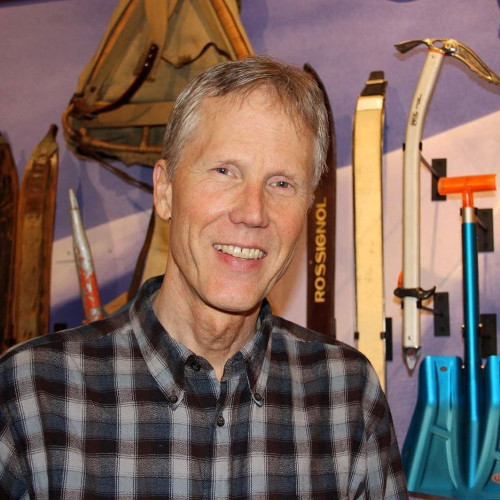- Posts: 371
- Thank you received: 0
For Hyak: Photos of glacial recession on Mt Hood?
- Jeff Huber
- [Gaper_Jeffey]
-
 Topic Author
Topic Author
- Offline
- Senior Member
-

Please Log in or Create an account to join the conversation.
- Lowell_Skoog
- [Lowell_Skoog]
-

- Offline
- Platinum Member
-

- Posts: 1460
- Thank you received: 16
Please Log in or Create an account to join the conversation.
- Jeff Huber
- [Gaper_Jeffey]
-
 Topic Author
Topic Author
- Offline
- Senior Member
-

- Posts: 371
- Thank you received: 0
The slideshow starts out with the text:
<br>I'm certainly not a scientist nor do I have any background in glaciology, this leaves me stuck with taking the interpretation of whatever source seems most credible.Some scientists say an increase in the rate of melting of the world's glaciers is evidence of global warming. <br><br>Argentina's Upsala Glacier was once the biggest in South America, but it is now disappearing at a rate of 200 metres per year. <br><br>Other scientists say its reduction is due to complicated shifts in glacial dynamics and local geology.
Please Log in or Create an account to join the conversation.
- andyski
- [andyski]
-

- Offline
- Senior Member
-

- Posts: 250
- Thank you received: 0
Please Log in or Create an account to join the conversation.
- Jerm
- [Jerm]
-

- Offline
- Junior Member
-

- Posts: 232
- Thank you received: 0
Please Log in or Create an account to join the conversation.
- Alan Brunelle
- [BigSnow]
-

- Offline
- Senior Member
-

- Posts: 260
- Thank you received: 0
Please Log in or Create an account to join the conversation.
- hambone
- [hambone]
-

- Offline
- New Member
-

- Posts: 1
- Thank you received: 0
<br><br>Of course climate change will continue. Look at history and you'll find that it is always changing. vathena.arc.nasa.gov/curric/land/global/climchng.html You'll see too that the rates of change are not constant either. It's hard to comprehend how a few hundred years of recorded data fits into the billions of years of earths history.I think the only debate at this point is why and will it continue and if so, how far will it go?<br>
It seems the debate is more about are humans responsible for recent climate change in the last few hundred years. My thoughts are that 200 years, or less, is what people tend to focus on, which to me seems like an insignificant time window in the bigger picture (200 years in 5,000,000,000 years is not much time). We still seem to be within normal historical ranges. At least that's what I see when I look at historical records.
Please Log in or Create an account to join the conversation.
- zenom
- [zenom]
-

- Offline
- New Member
-

- Posts: 33
- Thank you received: 0
Please Log in or Create an account to join the conversation.
- Charles
- [24!ShukSan$9]
-

- Offline
- Senior Member
-

- Posts: 388
- Thank you received: 0
Please Log in or Create an account to join the conversation.
- hyak.net
- [hyak.net]
-

- Offline
- Premium Member
-

- Posts: 601
- Thank you received: 0
Please Log in or Create an account to join the conversation.
- Alan Brunelle
- [BigSnow]
-

- Offline
- Senior Member
-

- Posts: 260
- Thank you received: 0
Please Log in or Create an account to join the conversation.
- hyak.net
- [hyak.net]
-

- Offline
- Premium Member
-

- Posts: 601
- Thank you received: 0
<br><br>Don't worry, I am NOT trying to convince anyone of any of my theories. I just give my personal opinion and really have no desire for debate. <br><br>This is what happens with such a poor snow year, we spend too much time discussing things other then backcountry ski trips. I sure hope it snows sometime soon so I can start hiking again and get a few turns.Actually, the recent recessions are not the continuation of the retreat of the last ice age, when the continent was largely ice bound.<br><br>Hyak is going to have a hard time convincing me that there is not warming going on by using photos of a couple of glaciers on some mountain side. <br><br>Alan
Please Log in or Create an account to join the conversation.
- Alan Brunelle
- [BigSnow]
-

- Offline
- Senior Member
-

- Posts: 260
- Thank you received: 0
Please Log in or Create an account to join the conversation.
- TonyM
- [TonyM]
-

- Offline
- Junior Member
-

- Posts: 97
- Thank you received: 0
Please Log in or Create an account to join the conversation.
- hyak.net
- [hyak.net]
-

- Offline
- Premium Member
-

- Posts: 601
- Thank you received: 0
Please Log in or Create an account to join the conversation.
- Lowell_Skoog
- [Lowell_Skoog]
-

- Offline
- Platinum Member
-

- Posts: 1460
- Thank you received: 16
<br><br>Yes, the ozone hole is a seasonal thing, but I don't think I've ever read (in the mainstream press) that ozone depletion was a myth. I just did a quick google on "ozone depletion" and found this NASA page:<br><br>www.nas.nasa.gov/About/Education/Ozone/history.htmlIn the 80's it became the Ozone hole scare, later to be learned the ozone hole is a normal occurance that changes with the seasons. You never hear of the ozone hole anymore.
If you scan down the page to "Current Goverment regulations" you'll find what sound to me like pretty stringent actions to phase out CFCs. These protocols are still in effect. My interpretation of the history is that the reason you don't hear about the ozone hole anymore is that we're doing something about it.<br><br><br>
Please Log in or Create an account to join the conversation.
- Jim Oker
- [jim_oker]
-

- Offline
- Elite Member
-

- Posts: 900
- Thank you received: 0
Please Log in or Create an account to join the conversation.
- Lowell_Skoog
- [Lowell_Skoog]
-

- Offline
- Platinum Member
-

- Posts: 1460
- Thank you received: 16
<br><br>An article in today's Seattle Times suggests that the "new ice age" problem is still a concern.<br><br>seattletimes.nwsource.com/html/nationwor...02183544_warm18.htmlIf memory serves you are using an logical fallacy called "poisoning the well" - in other words, attaching something that may have been shown to be wrong (predictions of a coming ice age) to something else (global warming being caused by man).
The concern is about fresh water shutting down currents in the Atlantic, which keep northern Europe and the eastern U.S. warmer than they would otherwise be, given their latitude.
Please Log in or Create an account to join the conversation.
- hyak.net
- [hyak.net]
-

- Offline
- Premium Member
-

- Posts: 601
- Thank you received: 0
<br><br>I feel like I'm caught playing dogpile on the playground and I'm the guy on the bottom.....<br><br><br>As I said earlier, I am not trying to convince anyone (I am no expert on this subject and I'll be the first to admit it), I just voice an opinion and tell why.....no big deal. <br><br><br><br>Hyak - interesting logic. If memory serves you are using an logical fallacy called "poisoning the well" - in other words, attaching something that may have been shown to be wrong (predictions of a coming ice age) to something else (global warming being caused by man). It was not a convincing tactic in high school debate, and it is not convincing now either. <br>
Please Log in or Create an account to join the conversation.
- Jim Oker
- [jim_oker]
-

- Offline
- Elite Member
-

- Posts: 900
- Thank you received: 0
Please Log in or Create an account to join the conversation.

